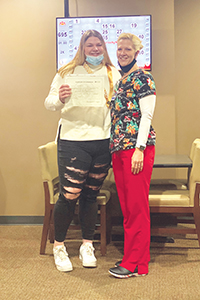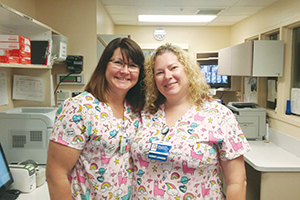Chewelah hospital has trained about 1,000 CNAs, many of whom go on to careers in health care
By PATRICIA CORRIGAN
A nursing assistant certification program at Providence St. Joseph's Hospital in Chewelah, Washington, is changing lives, one family at a time, even during the global pandemic. The program introduces participants to the medical field, provides a pipeline for potential job opportunities in the community, benefits patients — and it's free.

High school student Lexi Robertson, left, with her mother, Tara Livingston, pose after a pinning ceremony in December for Robertson and fellow graduates of the certified nursing assistant training program at Providence St. Joseph's Hospital in Chewelah, Washington. Livingston is a registered nurse at the hospital.
"During these times of increased need for health care workers, we are fortunate to offer a program that fosters bedside caregivers," said Jane Branda, a registered nurse who is the program director and instructor. "For 36 years, Providence St. Joseph's Hospital has provided nurse assistant training for between 20-25 students per year to help fill our job openings, and COVID-19 hasn't stopped us. Gov. Jay Inslee made it clear the program is considered essential."
With a population of about 3,000, Chewelah is situated about 50 miles north of Spokane.
Providence St. Joseph's Hospital is a critical access hospital, licensed for 25 hospital beds and additional swing beds. Students seeking certification as nursing assistants come from Chewelah and other small communities within a 25-mile radius, including Valley, Colville, Kettle Falls and Springdale, Branda said. They range in age from 18 to mid-60s.
To date, about 1,000 individuals have completed the 21-day program, which includes 126 hours of instruction and clinical experience. Graduates have been hired at Providence St. Joseph's Hospital, at DominiCare (Providence's nonprofit agency that serves individuals in need of nonclinical home services), at Providence Mount Carmel Hospital (a sister institution 23 miles from Chewelah) and well beyond. Last year, the hospital held six training programs.
"I know just how important the nursing assistant certification program is to bedside care," said Branda, who has headed the program since 2006. "I love to watch the students grow into the role and get satisfaction from what they are doing for people. They always discover potential they may not have known they had — I love to watch that, too — and I love that my team leaves options open for the graduates, so they can select from different areas of work."
Best foot forward
Ronald G. Rehn, chief administrative officer of Providence Health Care's Stevens County Ministries, is a member of that team, and he acknowledged Branda's compliment with one of his own. "The key to a successful nursing assistant certification training program is an engaged, excited person who is a champion for the students, and Jane is that person," he said.

Rehn
"The program offers education and employment, and that's a leg up into the health care world," Rehn said. "In a rural area, it's nearly impossible to recruit for nursing assistants from outside, so it's better to grow your own. We've found when we educate people and they get to know us, they are likely hooked, and they will come to work for us."
Stacy Fitzgerald, a registered nurse who lives in Valley, did just that.
She completed the nurse assistant certification training in 1999, worked in various jobs at the hospital until 2010 and then entered training to become a registered nurse. "The nursing assistant certification program is amazing for people in the community," Fitzgerald said. "I needed a decent job that was steady, and the training was just 12 miles away from my home. That allowed me to work around my job and my kids' schedule and it allowed me to take care of people of all ages, through all phases of their life."
Confidence builder
The nurse assistant training has been free since the hospital first offered it in 1984. Branda noted that similar courses at hospitals in big cities may cost $600-$800, and training at a community college requires attendance for an entire semester, plus the cost of textbooks. Students in the Chewelah program pay only for uniforms, registration certificates and the exam, which a state nursing agency administers.

Renae Fitzgerald, left, and her sister-in-law Stacy Fitzgerald both graduated from the nursing assistant certification training at Providence St. Joseph's Hospital in Chewelah and went on to become registered nurses at the hospital. Both women hold bachelor of science in nursing degrees.
Lexi Robertson, a senior at Jenkins Junior/Senior High School in Chewelah, completed the training in December. A doctor at a medical clinic where Robertson works part-time suggested she enroll. "I used to let our patients in, take their temperatures and help with cleaning, but now I take blood pressures and give COVID-19 vaccines," she said. "I'm proud of myself."
When she started the program, Robertson wasn't sure she could do the work. "But Jane makes sure you know the field, and the people at the hospital also helped make it easier, so I became more confident. Now I'm planning to become an ultrasound technician, which requires two or three more years of training."
The hospital offers employees tuition reimbursement for nurse assistant certification graduates who want to further their education. "At least a third have done that," Branda said. "Many have become registered nurses, aides, medical assistants, emergency medical technicians. One is a phlebotomist and one went on to become a doctor."
Big returns
Barbara Murray, a buyer for the pharmacy at Providence St. Joseph's Hospital and Providence Mount Carmel Hospital, went through the nurse assistant training program in the early years, when it was offered as part of the curriculum at the local high school. "It gave me a window into the medical field," she said. "First I did a stint in physical therapy, and that directed me to try massage therapy."
Before accepting her current job, Murray worked at a retail pharmacy, completed a course for pharmacy technicians and then worked as a medical assistant.
Murray cited the value of the nurse assistant training program for many individuals in northeast Washington. "It's great for students in a low-income town with not a lot of opportunities, it's great for a single mom or someone who can't move out of town and it's great for someone looking for ways to change or further a career," she said.
When hospitals elsewhere in the country call Branda about the training, she encourages administrators to start a similar program. "Hospitals seem to think it's daunting to run the training, but it's not," she said. "And when they ask me about whether to offer free tuition, I tell them they will get that back a hundredfold."